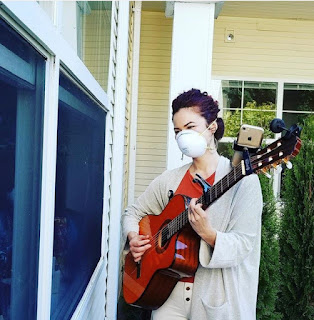In this Faces of Caring blog, Jennifer Kennedy, Senior Director, Quality & Regulatory at NHPCO, reflects on a very personal moment she had recently. COVID-19 has changed life for all of us and it’s moments like these that remind us that we must adjust to a new normal, even though it can be incredibly difficult.
I had an incredible aha moment this week related to a personal loss in my family. My 14-year-old dog Murphy, who has been a part of my family for 12 years, died with the compassionate assistance of my vet. It was incredibly emotional and necessary to be at his side during the process as I was his primary caregiver and nurse for most of his life. I was able to pet and hold him until he took his last breath and then I held him again until I was ready to say goodbye. But then it was time to leave the office and I could not hug the vet whom I have known for years and has treated me and my dog with empathy and concern during the palliative and hospice journey of his life. She said she did not want to take the risk of exposing me to the COVID-19 virus. This was my aha moment! It became very real to me that people are losing their human loved ones related to COVID-19 and they may not be with them at the end of their life due to infection control restrictions. They cannot hold their loved one’s hand, hug them, or even receive comforting touch from healthcare providers. They cannot gather for a funeral or hug or touch their family and friends. So much of end of life care involves compassionate touch and not being able to provide that alters the experience.
As a hospice nurse who is no longer at the bedside, I knew all of these concepts since the pandemic began, but it became very real for me this week. If I could not have been with my dog at the end of his life, I would have been extremely upset. But, if I could not be with a loved one at the end of their life, I would be devastated and not know how to process my grief. It is extremely important that hospice providers plan to accommodate a different grief process during this pandemic. We need to help people work through absence of presence and touch that would normally happen during the last days and hours of a person’s life. Families cannot gather for a funeral to say goodbye to their loved one and share supportive physical touch from family members and friends. When I think back to the death of my parents, physical touch from my family and friends is what sustained me.
We must do the right things during this pandemic to decrease the spread of the virus, but we must also realize the toll that not being able to be with or touch a loved one at the end of their produces a different type of grief for families. As hospice professionals, we need to be ready to meet this challenge.
The Faces of Caring campaign was created for hospice and palliative care professionals to share their experience providing care during the COVID-19 pandemic. If you would like to share your photos and stories from the front lines, please go to www.nhpco.org/faces-of-caring.








